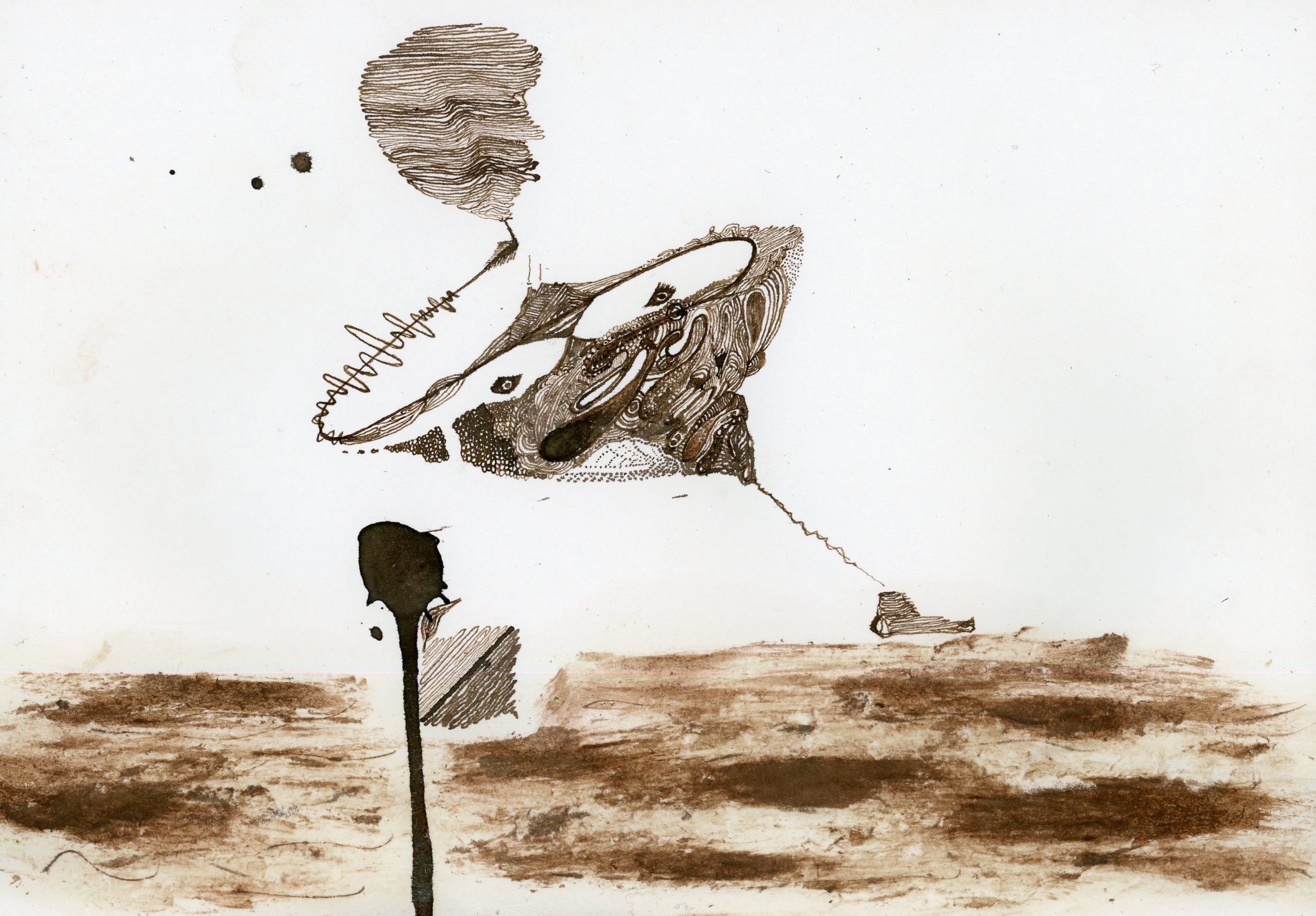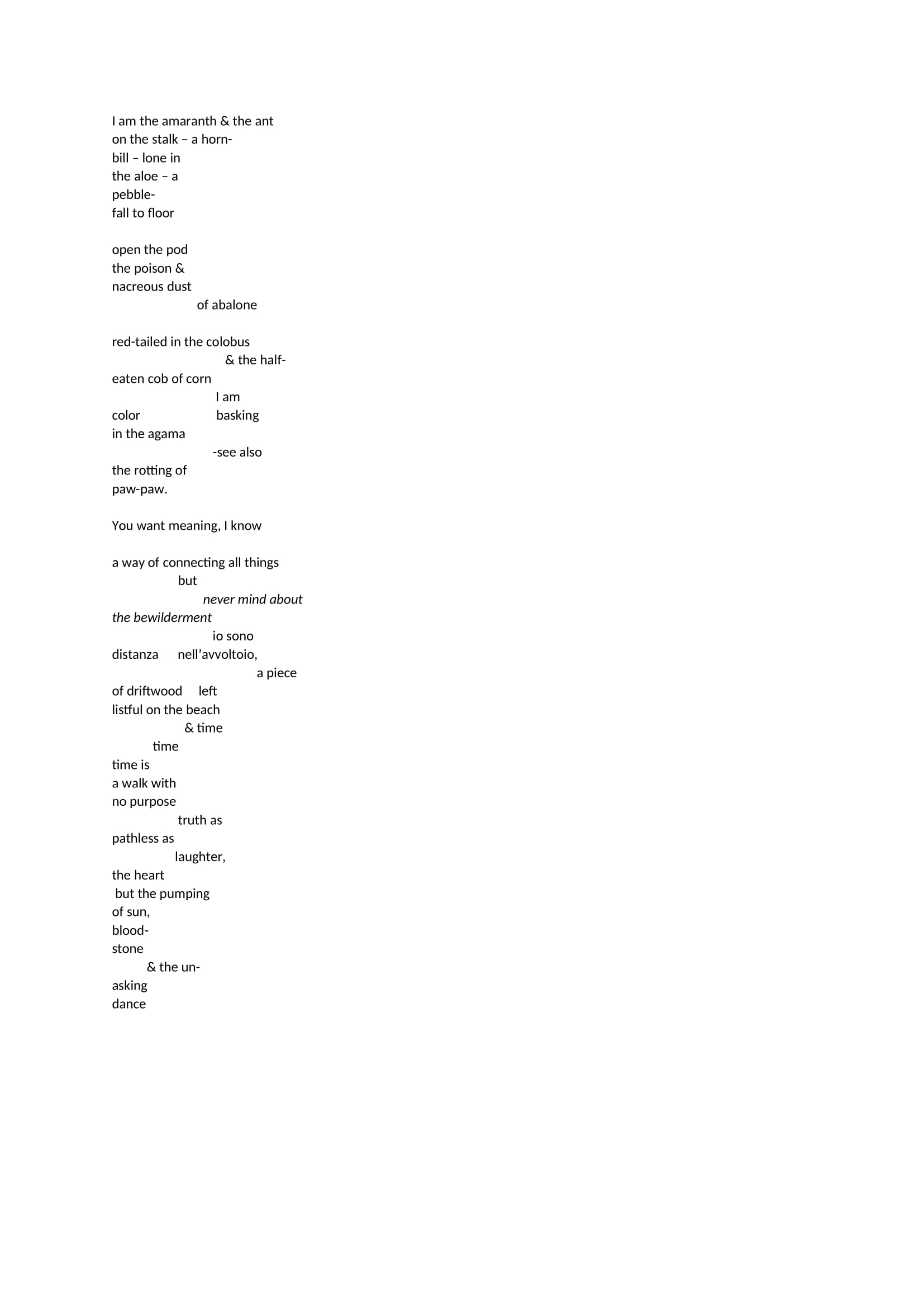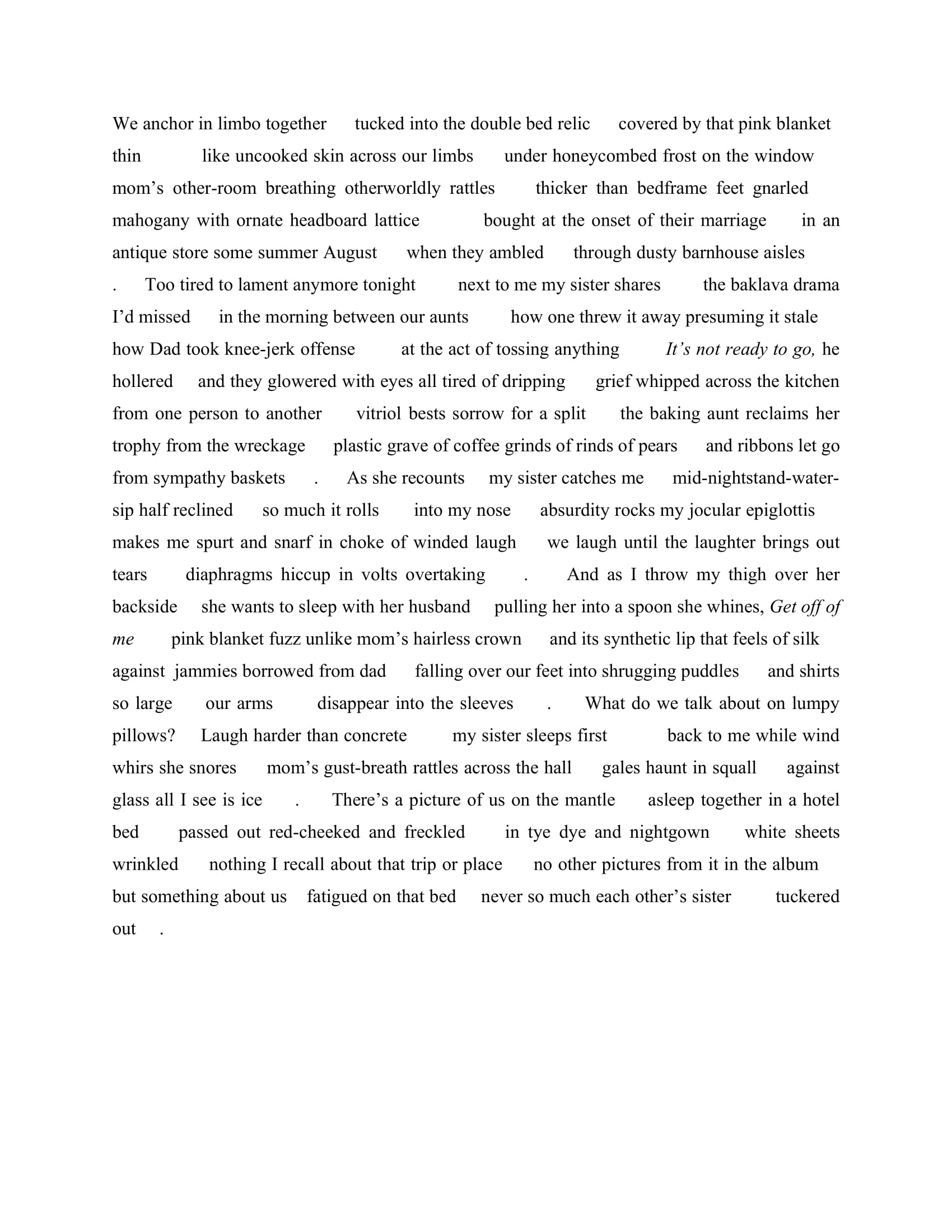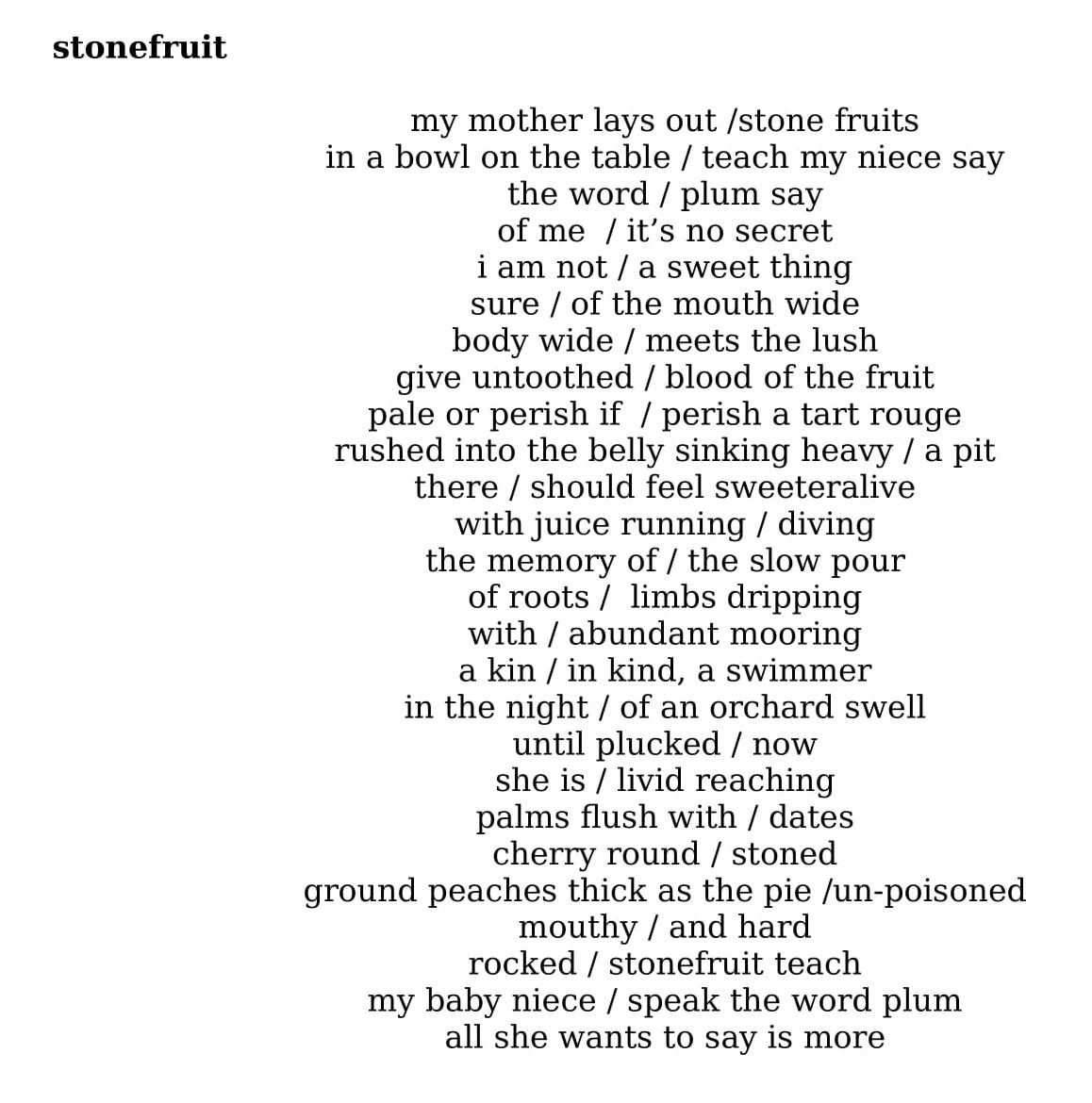Once upon a time they used to think Miasma was the bad air from the rotting of organic waste that was going to make you die a horrible death. It was the fear of bad air, like the fear of the boogeyman wearing a stinky, second-hand coat made of breath. I, myself, have never been afraid of the night air. I used to be afraid of myself. I used to be afraid of failure and unrequited love, and afraid that love wasn’t even a thing, and that possibly everything that is happening isn’t actually happening. I also used to be afraid of ageing and being forced into believing in ageing as some sort of spectacular adventure. In fact I used to always be afraid. Now I don’t give a shit.
Today Miasma is what the experts call the mysterious disease that is killing millions of assigned females at birth.
The week before it had gotten so cold in New Orleans that the pipes had exploded in protest. You couldn’t drink the water. You often can’t drink the water in New Orleans, or so I was told. So much water and not a drop to drink. When I typed into Google, Why is Louisiana, it asked me, so racist? At that moment I just wanted to know about the coastline eroding, the water salinity. Curtis told me about water. He had written to me a lot about water, in circles of whirlpooly prose. It was his second favourite thing after 19th century creepy pharma. He also told me to come down to New Orleans for a weekend. Come for Mardi Gras. Maybe it will be the last Mardi Gras. The last Shrove Tuesday. We could mash our bodies together on mountains of pancakes as we disintegrate like salt in stew.
Flights are cheap. There are those that are in denial and think that they can get rich, or richer. Or maybe it’s the old saying, whoever has the most toys when they die wins. But that’s just me thinking that the plague will stop being so misogynist and half the population should be concerned that the other half the population is dropping like flies. Straight, white cis-men are getting richer, but what else is new.
Our flight attendant served us wearing a panda suit since nothing matters. Halfway through the flight we threw beads at him trying to get them around his neck. The winner got five mini bottles of champagne that she then shared with her row. Fizz and frolic filled the cabin as they sang Gloria Gaynor’s I Will Survive. I pegged the winner for dead by the end of the week. She looked like she already had the sick.
Curtis is a tour guide. A 19th century New Orleans pharmacy expert-of-sorts. He gives tours of a small pharmacy museum in the Latin Quarter. He can tell you what the rich used to try and cure themselves with over a century ago. This information could be useful, but probably isn’t, like most things one comes across in life. For an hour every day he acquaints people with a time in which both of us would surely be already dead, so we should thank our lucky stars, or lucky charms, that we’ve had this extra time.
Back then, a hundred years ago, looking for love must have been hard, you didn’t have all the time in the world. All those love poems, stories, ballads, myths of yore, they weren’t really timeless, at least not ageless. Love was for the fresh faced, virginal. It was quick, short-lived, clipped by malaria, yellow-fever, tuberculosis, syphilis, death in child birth, or maybe something super swift and snappy like a blow to the head in a petty dispute about a donkey. Curtis’ city is full of it, of death, stories of death, and perhaps bad sewage management, and lots of colonialism, slavery, socio-economic inequality, and a feminine named hurricane that devastated and killed. Not that not any place isn’t full of death if you scratch a little at the surface, but his city has made an industry of mortality.
Curtis wrote me online that death was so fashionable back in the 19th century that looking like you were about to die was incredibly en vogue. Dying got you laid. He told me that the French sent women over for the settlers. Women to please and procreate. First nuns as a joke, then criminals for the laugh, then a boat of 48 emaciated and scurvied virgins to marry those randy men. The men thought the women were vampires. Those women probably tried to bite the men’s necks to get them to stop humping their legs.
Curtis and I meet after I check into my hotel that’s haunted by the ghosts of two teenage boys. The boys like to perch themselves on the ceiling and snap photos of the guests while they sleep snuggly in their beds. This is a nicer story to tell people than the tale about the guy who takes selfies with other peoples’ toothbrushes inserted up his ass.
I’m wearing a thin, striped dress, tennis shoes and flesh coloured tights. He’s wearing tight jeans and a tucked in, pressed blouse, a cardigan with worn out elbow patches, and boots that match his time period of choice.
We meet on the corner of 1st and Jackson in the Garden District. I’ve got belladonna in my eyes to look more seductive. I want to walk by the rich houses full of dark pasts, their ironwork shackling the spirits inside. The air feels thick with trauma, but that’s probably just the humidity that I’m not used to. He holds my hand. It’s sweaty and seems too soon to have our fingers entwined. I trip over roots growing out of the sidewalk. Everything is coming out of the ground as I feel myself going into it. The floating corpses have popped out of the cemetery. I lie and tell him that my parents are dead. It’s easier than explaining that they just don’t like me. He tells me his father is in a graveyard in Wyoming that he never visits. A gnat flies in my eye. We stop at the gates of a graveyard and watch the swampy sky suffuse into the horizon.
After we’d started chatting online and he told me about bloodletting I’d taken up a leech fascination and subscribed to Leeches U.S.A. I took my monthly catalogue of leeches to bed at night and memorized their markings and their names. I wondered what they tasted like fried. I started touching myself while I looked at the photos. It became a thing. My thing. Sometimes I imagined Curtis as a giant leech with a human face. Sometimes I just imagined a leech. Live leech shipping is done once a week, even now, all things considered. The fishermen aren’t worried. It’s in their name. I tell myself that if I live through this I will find a therapist and talk about my love of leeches.
I told the queer woman sitting next to me on the plane that I was going to visit a cis-man that I met online and try and fuck him. She told me that it was wise to try and get knocked up and told me that if I laid on my back and lifted my pelvis up after intercourse it increased the likelihood of success. She wished me luck, then we chatted about our evil stepmothers like we were talking about the best brand of wool socks to make it through an unseemly cold Canadian winter.
We get in Curtis’ van after staring at the fancy houses full of nightmares. I’m sure Curtis’ van will be where we shag but instead we drive out to the swamp inspired by the sky. It’s all around us, closing in on us. The swamp. The cypresses. The sky. We get on a crowded boat. The noise of the people and the engine muffles the sound of our heartbeats, our breathes. The boat driver wraps masking tape around a baby alligator’s mouth and passes it around. Two teenage girls from Missouri squeal in delight. One of them has a visible bump in her belly. My heart twitches and gets stuck like a Y on an old typewriter. I wonder if I’ll be so lucky. I look out at the Spanish moss and try and calm myself in their entanglements. Curtis puts his hand on my back. I can barely feel it. Two raccoons sit in a leafless tree. Two vultures on a power line. The water moves into the M-I-S-S-I-S-S-I-P-P-I. Somewhere in the Delta it is all swishing around, chaotic, organized pandemonium. It knows where it’s going.
Afterwards Curtis takes me to a parade of dogs wearing medieval frocks that bark in unison. He places beads around my neck but I take them off.
I’m allergic, I say, though I am not. I’m just not feeling frivolous.
We borrow late nineteenth century costumes from his friend’s shop. Curtis says we need to wait until very late, when there is hardly anyone around. We need to live life like it was. I ask him to acquire a mule, kill it and leave it on the street rotting for a couple of days first. I am ready for authenticity.
I am ready for a lot of things, and only one thing that I am not. I am not ready to die.
He tells me to come by the pharmacy at eight. Two hours after the Miasma sets in because they still only think that it comes out at night, like zombies and ghouls and murderous shadows, though some theorists claim it’s always out but only at night it is more visible. No one can reach a consensus. Maybe because it’s about the assigned female bodies at birth.
I am laying on my bed in the hotel staring at the ceiling with the lights off hoping the boys will come and take my photo. I open the top two buttons of my dress to entice them. I want them to find me interesting, to find me sexy. Everything seems contingent on this, turning cis-men on. Thanks history for that. The Miasma is coming through the open window and biting my ankles. I fall asleep to the notes of a funerary brass band from outer space.
I am late to meet Curtis and haven’t changed as I scurry through the crumpled streets to the pharmacy. No matter, he hands me a dress, armpits anciently stained yellow as I come in the door, sequins rattling to the floor as I pull it over my head. Stars fall from the sky. He sits down at the soda counter.
Root beer made with sassafras, he tells me as he hands me a glass. Our fingertips brush against each other. I feel my cheeks flush and wonder why we hadn’t done it in his van. Why have a van if you don’t fuck in it?
The Miasma is seeping under the door. Our chemistry is tepid. My veins thicken. I think about how much my step-mother hated me, and how that was the sassafras of a lot of my problems. I put my hand on his penis. It hardens through his pants. He reaches his hand under my dress and inserts two fingers into me and starts to pump them in and out. It’s not necessary but I don’t stop him. I close my eyes and help him along. I come around his knuckle. The window frames rattle, from what I don’t know. I wonder if this will be the last orgasm I ever have.
He takes me for a tour of the pharmacy, holding the bottles of curiosities up to my nose. I don’t need to change positions for this. I sit on the soda counter with the musty dress pulled up around my thighs. The drunken pound the sidewalk outside. I’m afraid the windows will collapse from their intoxication. I’m wondering why he hasn’t knocked me up yet.
He spends his days showing people these little jars of chocolate covered mercury to cure syphilis, and explaining how the rich had the gold covered ones, and how that they could just take one, poop it out and take it again. The eternal pill. The queer woman on the plane called her step-mother a pill after she told me that she too was trying to get pregnant.
There are rumours, some more substantiated than others, that the hormones from pregnancy will keep the Miasma away, that pregnancy is a sort of vaccination against it. More specifically the human chorionic gonadotropin (hCG) that is produced by the placenta. But there have been a lot of rumours: bathing in gasoline, standing facing west just after sunrise when the light is the most unmolested, cashews, eating radium.
It’s all we have, but only some of us. Something is never for everybody.
He holds up the jar of lytta vesicatoria to me. I squint in the almost darkness as I read the jar. They look like miniature marbles, or the eyeballs of newts and fairies.
What are they? I ask.
They’re beetles.
Why do you do this?
Why does anybody do anything?
I shrug and sit down on the floor. It is cold and I am tired.
Miasma was the theory that bad air caused diseases. Even after John Snow said, No it doesn’t. It still took several years before Robert Koch finally convinced people that germs were the culprits, which would decrease the death rate the world over. Now they use the same word. They don’t know what it is. I wonder if it matters since you have to not have a Y chromosome in order not to get it. Some people say one too many nuclear power plants leaked, an unexpected side effect of climate change, or that it’s a conspiracy to kill off the useless in society.
My partner left me, said I was too droopy. I worked in a bar and fucked all the tourists, he tells me. I tell him that my partner left me too because I’m droopy. No tourists though. I feel as though he’s one-upped me.
I take the jar of beetles out of his hands. When I was a teenager I desperately tried to believe in vampires. I wanted to live forever. I wanted to be beautiful. I wanted to look dead. I wanted to believe. I wanted someone like him to have wanted to fuck me. Maybe he would have. He didn’t seem like he was fussy back then. He doesn’t seem fussy now. If I squint my eyes he almost looks like a vampire. I’d rather be a vampire than a mother. I can always put the baby up for adoption.
He takes the jar of beetles and hands me a jar of what looks like insect wings. They are brittle and shimmering. These, he says as though I’m supposed to know what they are, at least to have been expecting them.
My ex left me for a younger, wealthier woman who was better at everything than me. She was literally a new model of me. I told my ex that and she said, You’re just jealous. Of course I was, but it was at that moment that I realized that my ex wasn’t as deep, or as perceptive as I had believed that she was. They are both pregnant. It was my ex who called me and told me to do the same. I laughed, then I hung up and cried.
Rich women used to smear this on their faces to get a blue tinge to look like death.
It’s empowering this re-appropriation of death.
Curtis gets up and goes to the bathroom. He leaves the jar of wings in my hands. I quickly unscrew the lid and reach my hand inside. I feel the wings, brittle, almost disintegrating at the touch of my fingertips. I open my hand wide and grasp a fistful, leaning my face over the open jar I rub as much as I can over my skin then put a handful in the coin part of my wallet. I pull out my compact to check my reflection and wipe away the excessive crumbled, crumpled wings. My reflection still looks very much alive. It still looks like me, at least what I can make out in the dark room. I’m still here.
If there had been more time I would have stolen one of the golden pills too.
I pull him towards me as I lift myself up on the counter behind me. We are across the room now. The counter is much higher than the soda counter is. I struggle and fumble, as does he as he tries to lift me up by my thighs. I whisper in his ear, I want you to come inside of me. Past experience has taught me that some cis-men really like that when you say that to them, that or I want you to cum in my face. I’m gambling and hoping it’s the former. He’s at least receptive. I imagine he must know what I want. Of course he does. I close my eyes as he groans awkwardly and I try to wish my egg from what I’m sure is my left ovary this month. I wrap my body around him like a giant leech, like my life depends on it. The counter smashes violently beneath our weight, knocking the beetles and wings and mercury onto the hard, slate floor. Wings flutter up and away as the glass and blue backs come to rest silently and twinkle on the floor.
He doesn’t stop. He keeps going until he finishes. He asks me, Do you think you’ll die?
I nod my head softly, probably too softly for him to see. He doesn’t ask again.
I go to my hotel after I get five stitches in my thigh. I tell him that I’m a light sleeper, especially after being torn apart. He finds that funny. It’s the first time that I’ve seen him laugh. I let myself imagine for a brief moment that I’m in love with him, but it doesn’t suit us. After he drops me off I head over to Bourbon Street, where the dredges of humanity dwell in their touristic apocalypse, cheering every moment like it is their last. I pick up a trumpet player from a band. He’s musical, tall, and has a strong jawline, just in case I decide to keep the baby. I fuck him in the bathroom then I go back to my hotel room and lay on my bed looking at the teenage boys looking at me. They seem interested now. Maybe I’m glowing from sex. Maybe I’m glowing from pregnancy.
It’s the same flight attendant on my way home and this time I win, so I give the five bottles of bubbly to the woman sitting next to me. Her veins are already dark like freshly paved roads through wild fields of baby breath. She needs them more than I do.
I take the moths out when I get home and look at them through the baggie. In front of the mirror I take off my clothes to see if I can see a change. I turn around and look at the scar along my thigh. My veins glisten under my skin. I probably won’t try and smear the wings on my cheeks again. I want to save them. I’m going to write in my will that I want them put on my face when I die.
__________
AMBIKA THOMPSON’s favourite colour is rainbow. They have been published in several international publications including Electric Literature, Crab Fat Magazine, Fanzine, Joyland and The Fiddlehead, is the recipient of a Research and Creation grant from the Canada Council for the Arts (2021), has an MFA in creative writing from Guelph University (Canada), is working on a couple of novels and a short story collection, and runs creative writing workshops online and in Berlin. ambikathompson.com
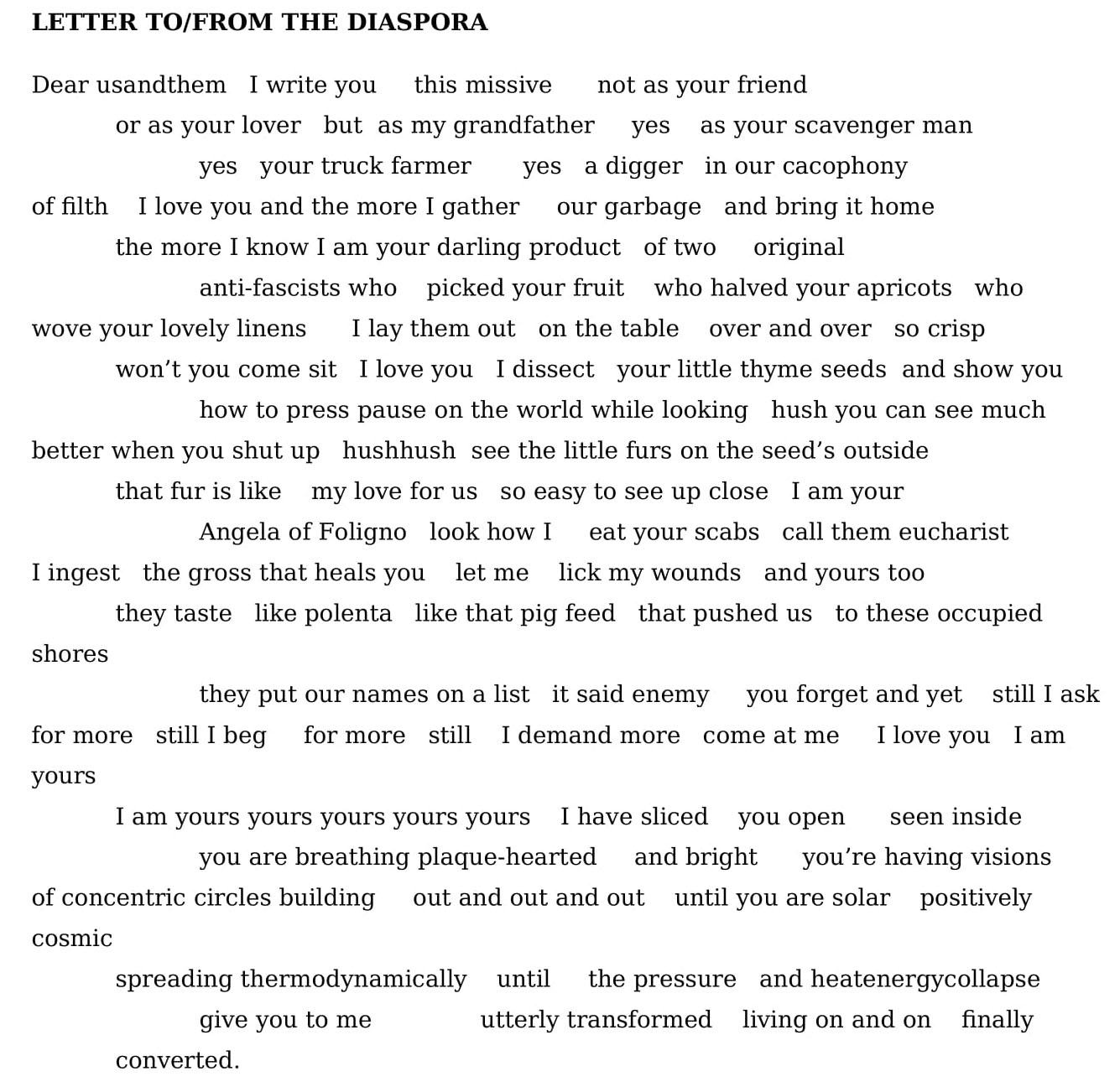
![[PANK]](http://pankmagazine.com/wp-content/themes/pank/assets/images/pank-logo-large.png)

